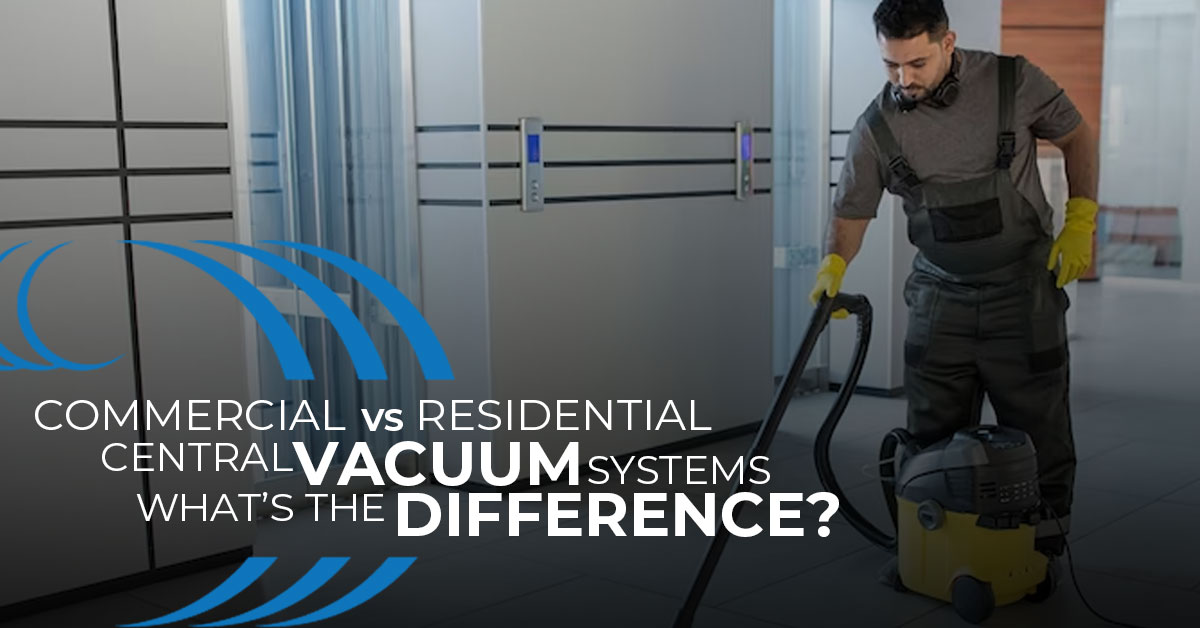
Boosting Productivity in Office Buildings with Central Vacuum
In today’s fast-paced work environment, maintaining a clean and organized office space is crucial for productivity. Office buildings often struggle with keeping their premises clean

When it comes to maintaining cleanliness in our spaces, vacuuming plays a pivotal role. However, it’s crucial to note that not all vacuum systems are created equal. In fact, there’s a significant difference between Commercial Central Vacuum Systems and Residential Central Vacuum Systems. In this article, we will be Comparing Vacuum Systems, thereby helping you understand these differences and guiding you in Choosing a Central Vacuum System that best suits your needs.
Before we dive into the Central Vacuum System Differences, it’s important to comprehend what a central vacuum system is. It’s an integrated vacuuming system that eliminates the need to lug around a bulky vacuum cleaner. The system comprises a central power unit usually situated in an out-of-the-way place like a basement or garage, and a network of pipes that connect to various inlet valves throughout a building or home.
Commercial central vacuum systems are designed to cater to the heavy-duty cleaning requirements of commercial spaces such as offices, hotels, and retail stores. These systems are generally larger and more powerful than their residential counterparts. They often have larger dirt collection containers and stronger motors to effectively clean larger areas.
The durability of commercial systems is another notable feature. They are built to withstand frequent and heavy use, often made from heavy-duty materials. However, this increased power, size, and durability come at a higher cost.
On the other hand, residential central vacuum systems are designed for home use. These systems are usually smaller and less powerful than commercial systems but are more than capable of handling a home’s cleaning needs.
Residential systems are also easier to install and maintain than commercial systems, making them a popular choice among homeowners. While they may not have the same level of durability as commercial systems, with proper care and maintenance, they can still last for many years.
When comparing vacuum systems, the main differences lie in their size, power, durability, cost, and maintenance requirements.
Commercial systems are larger, more powerful, and more durable, designed to handle the rigors of commercial cleaning. They also have larger dirt collection capacities and are built to withstand heavy usage.
Residential systems, while smaller and less powerful, offer enough performance for home use. They are easier to install and maintain and are generally more affordable.
When choosing a central vacuum system, it’s essential to consider your specific needs. If you’re looking for a system for a large commercial space, a commercial central vacuum system would be the ideal choice. However, if you need a system for your home, a residential central vacuum system would suffice.
In conclusion, both commercial and residential central vacuum systems offer effective cleaning solutions. The choice between the two primarily depends on your specific cleaning requirements, budget, and the size of the space you need to clean. By understanding the differences between these two types of systems, you can make an informed decision when investing in a central vacuum system.

In today’s fast-paced work environment, maintaining a clean and organized office space is crucial for productivity. Office buildings often struggle with keeping their premises clean

Central vacuums in animal shelters & vet clinic: Explore how these systems boost hygiene, efficiency, and air quality.

In the world of home entertainment, a home theater is a luxury that many homeowners dream of. It’s an immersive experience that brings the magic

A central vacuum system is a significant investment that promises convenience, powerful suction, and improved indoor air quality. However, choosing the right central vacuum hose
Our home automation products are at the forefront of technology, offering a blend of convenience, security, and efficiency. As a Homewave dealer, you’ll be part of a network transforming homes into smart, futuristic spaces.
Embark on this rewarding journey with us and leverage the power of innovative technology.
Please fill out this form and become a Homewave Dealer.